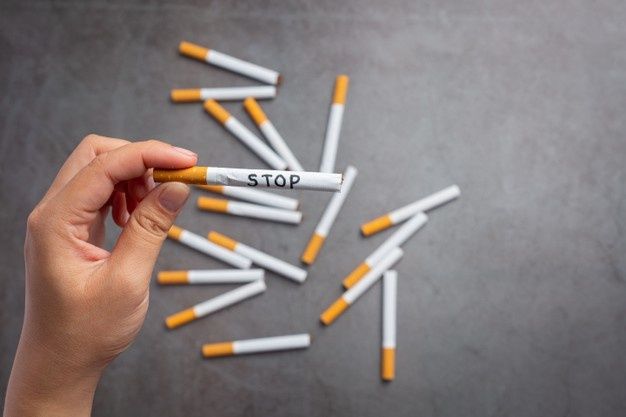
Great American Smokeout is November 17
Despite what we know about the harms of tobacco use, about 34 million people in the U.S. still smoke. Smoking leads to about 480,000 deaths annually, making it the most prevalent cause of preventable death globally.
For some people, quitting smoking is one of the toughest things they will ever do. However, kicking the habit for good is a little easier if you know you are not alone. This November 17, you can join others nationwide to abstain from smoking for just one day. It will be essential to improving your health and living your best life.
What Is the Great American Smokeout?
Over 40 years ago, the American Cancer Society designated the third Thursday in November as the annual Great American Smokeout. This day raises awareness of the health risks of smoking and the benefits of quitting.
Overall, smoking rates have been on the decline for several decades. However, people in marginalized ethnic groups, military personnel, LGBTQ+ communities, and individuals with behavioral conditions tend to smoke at higher rates than the general population.
This year, November 17 is a day when people can commit to living smoke-free for the whole year and encourage others to do the same. This day can also remind us about the resources available to help people ready to quit.
Why Is the Great American Smokeout Only 24 Hours?
Changing a habit takes time, but it can be overwhelming to think about quitting an addictive habit like smoking, especially if you have been doing it for years. That is why the American Cancer Society encourages making a change for just one day. Setting a 24-hour goal makes quitting seem more doable.
Also, if you can steer clear of tobacco for just 24 hours, you double your likelihood of quitting for good. You might also be encouraged that after just one day of no smoking, your body sheds carbon monoxide, which keeps your blood from transferring valuable oxygen to vital organs and tissues. Another positive effect of a one-day smoking break is that your lungs will start removing harmful smoking debris and mucus obstructing breathing.
Tips on Quitting Smoking
There is no single correct way to quit. The best method is one you can commit to. It also helps to get support from someone you know and trust.
Many people decide to quit all at once. With this approach, there is no nicotine replacement or medicine to assist. If this method seems impractical or too extreme, you might opt for tapering off in gradual increments, allowing your body to adjust to the decreased nicotine intake. For instance, you might reduce the number of cigarettes you smoke each day or the number of places in and around your home where you smoke.
Individuals have tried to stop smoking by using deterrents, such as over-the-counter drugs that alter tobacco flavor or diets that control nicotine cravings. However, research has not yet confirmed that any of these methods work.
Other approaches include using other nicotine products like filters or electronic e-cigarettes. These are not effective at curbing cravings; they merely replace one behavior for another. The same is true for tobacco lozenges or snuff.
Smoking e-cigarettes or “vaping” has become more popular and is a method many people use for smoking cessation. According to the Centers for Disease Control and Prevention (CDC), there is not enough research to confirm that vaping is an effective way to quit. However, e-cigarettes are harmful to teens, young adults, and pregnant people. Also, people not used to tobacco products should not start vaping.
Suppose you get through your first day of quitting. While those first 24 hours are a significant milestone, the key is to stay tobacco-free. There are several healthy habitsyou can adopt to remain strong in the face of serious cravings:
- For a couple of months, avoid foods or drinks you have typically consumed with a cigarette, such as coffee or an alcoholic beverage.
- Anticipate future events or situations that trigger your urge to smoke. Decide in advance how you will cope with the cravings.
- Eat 4-6 small meals instead of 2-3 large ones to keep your sugar and energy levels balanced. Doing so may reduce your cravings.
- Engage in self-care, such as eating well and getting plenty of sleep, which can help you deal with the stress of quitting.
- Get short bursts of exercise or go for a brisk walk.
- Go to public places where smoking is prohibited.
- Hold something in your hand, like a paper clip or pencil, if you miss the tactile feeling of a cigarette.
- If you miss having a cigarette in your mouth, use a toothpick, sugar-free candy, or raw vegetables instead.
The American Cancer Society offers helpful tips and tools if you or someone you know is trying to quit. For more information, you can call 1-800-227-2345. You can also go to their resource page to talk to someone on live chat and access helpful links. You can also download materials that help spread the word about the Great American Smokeout on November 17.
Research and materials for this article were compiled, written, and distributed on behalf of the National Public Health Information Coalition. The views and opinions expressed in this blog are those of the various authors and do not necessarily reflect the official policy or position of the National Public Health Information Coalition or its members.
References
https://www.cancer.org/healthy/stay-away-from-tobacco/great-american-smokeout.html
https://www.cdc.gov/tobacco/basic_information/e-cigarettes/about-e-cigarettes.html
https://www.cancer.org/about-us/online-help/contact-us.html
https://www.cancer.org/healthy/stay-away-from-tobacco/great-american-smokeout/resources.html

